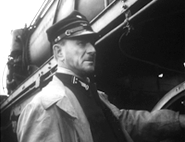At dusk, the impressive sight of a steam engine passenger train bisects the horizon, traversing an empty stretch of track under construction near a rural train station. The train engineer Zapora (Zygmunt Listkiewicz) and his junior assistant Nowak (Roman Klosowski) perform a station check of the semaphores and, upon seeing only one light on, proceeds through the intersection at normal speed before coming into an abrupt and violent stop at the unexpected sight of a man standing on the tracks. A cursory inspection of the accident site reveals that a second light source had been removed from the semaphores, creating a false indication of all clear in what was intended to be a warning sign to proceed slowly through the intersection in order to minimize risk of derailment on the tracks undergoing repair. On the side of the tracks lies the body of a recently retired engineer named Orzechowski (Kazimierz Opalinski). From these suspicious (and seemingly damning) set of physical clues, a team of accident investigators that include high-ranking officials from the railroad workers union gather at a stationhouse and attempt to recreate the circumstances behind the tragic incident. Volunteering to provide the initial testimony is an ambitious and opportunistic stationmaster named Tuszka (Zygmunt Maciejewski) who testifies on his strained professional relationship with the exacting engineer, first as a subordinate whose mechanical oversights never escaped Orzechowski’s meticulous eye, and subsequently, as a superior unable to compel his senior employee into implementing unproven (and clearly substandard) practices in the name of worker efficiency. Implicitly revealing his own insecurities towards his vocational competence and unearned position of authority, Tuszka sets the stage for Orzechowski’s character assassination.
Based on a screenplay by novelist and screenwriter Jerzy Stefan Stawinski (whose novel Kanal was adapted for the Andrzej Wajda film), Man on the Tracks is a penetrating and trenchant examination of conscience, individualism, and obsolescence. From the rhythmic introductory title sequence shot from the rails of a passing train, Andrzej Munk presents an intrinsically human perspective from beneath (and subliminally crushed by) the interminable wheels of progress and industrialization. The inferential metaphor is further reinforced in repeated images of fuel servicing, coal shoveling, checkout inspections, and mechanical repairs that depict workers as faceless, commodified labor (note the soot that repeatedly cover the assistants’ face, a figurative erasure of identity that is subsequently underscored in Orzechowski’s hesitant pause before recognizing Zapora at a public park) that serve the industrial machines, a theme that similarly pervades Wajda’s depiction of turn of the century, pre-communist Lodz in The Promised Land. Filming in primarily dark tones and framing a procedural, reconstructive mystery within the idealized, competitive environment of Soviet-modeled Stakhanovite worker efficiency demonstrations (a sociopolitical incentive that Wajda also subsequently explores in the seminal film, Man of Marble), Munk incisively captures the pervasive psychological atmosphere of distrust, paranoia, and denunciation that inevitably resulted from widely reported acts of sabotage (from both willful resistance to the movement and unintended consequences of detrimental practices resulting from unrealistic and goals) that, at times, unfairly led to both over-inflated commendation and public scapegoating at the seeming whim of (politically motivated) fate. It is this systematic marginalization of the individual for the purported benefit of a collective that is inevitably captured in the bittersweet irony of the film, the human consequence of social revolution reduced to cynical scrutiny, needless self-sacrifice, and anonymous heroism.
© Acquarello 2005. All rights reserved.
